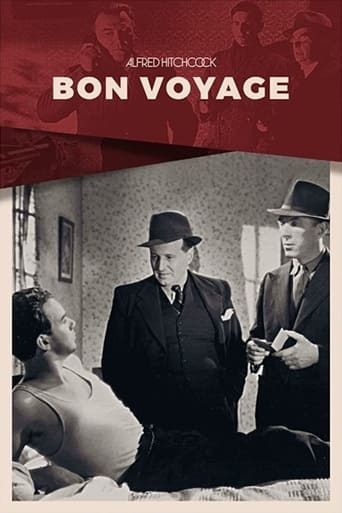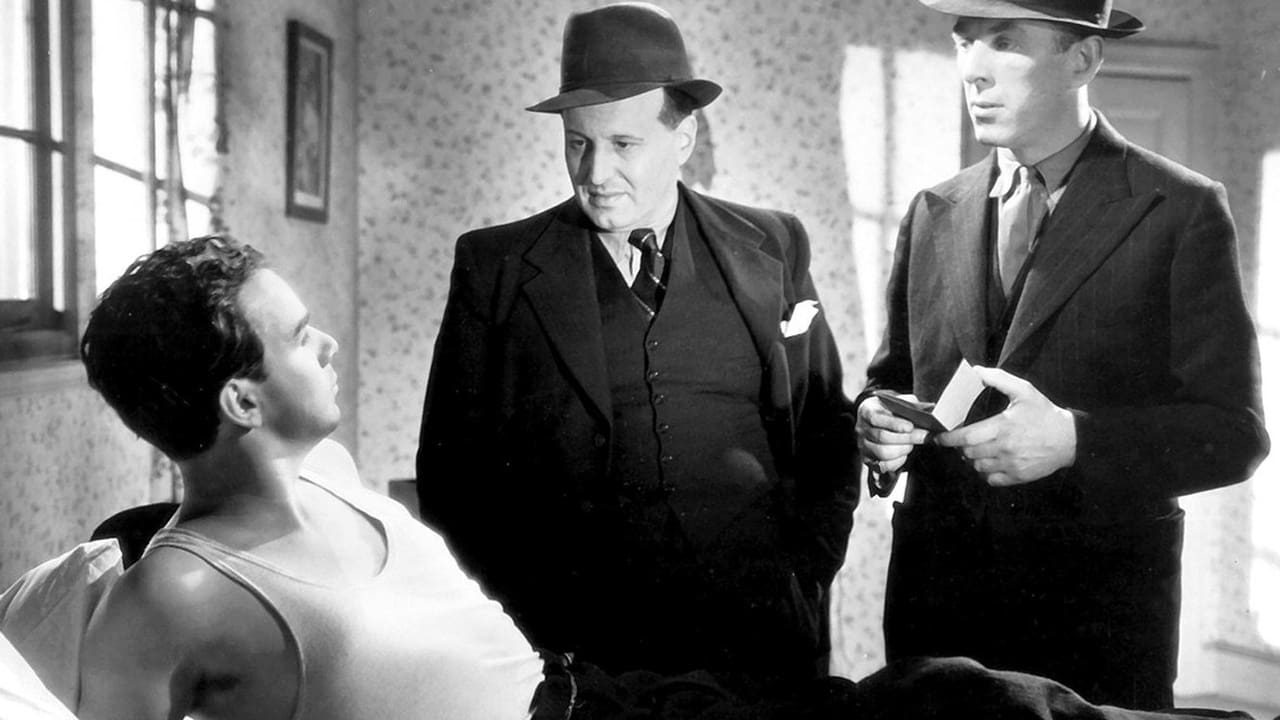blanche-2
"Bon Voyage" is a very short propaganda film about the French resistance which Hitchcock did for the war effort in 1944. It was met with disappointment and later shelved.The only person billed is John Blythe; the rest are called "The Moliere Players" to protect them from the Nazis.Blythe plays a Scottish RAF Sgt. John Dougall. He is being debriefed about his escape from France by French intelligence officers in London.Dougall has escaped from a prisoner of war camp along with Stefan Godowski, who actually put the plan together. The two stick together until there is a Resistance-aided pick-up in France by plane. But only one can go, so they shoot dice for it. Dougall is the one to leave. Upon meeting with the Intelligence agents, Dougall says that he hopes Godowski made it and wants to know what happened. As it turns out, although the agents wanted Dougall's story about how he was helped along the way, they already knew it.Good story, but it was too low-key for what the government wanted from Hitchcock - a real rah-rah story and big ending concerning the Resistance.Instead, it showed ordinary people taking risks, which I found moving and effective.An old woman I knew was in Vienna studying just before the war broke out and, for academic reasons, went looking for Heinrich Mann, who was hiding out in France. (And I just saw a film about this very thing, Varian's War). On the beach, she saw a man and woman playing ball on the beach, and the ball kept landing near her. They turned out to be members of the Resistance. I believe she did find Mann in a bar somewhere, but what impressed her (and me) is that this couple told her that they would never quit their work until Nazism was defeated.In the end, I think Hitchcock told the right story. It's not the big triumph but the work that people do leading up to it, sometimes small things, that win a war.
classicsoncall
Perhaps my two cents worth here might help concerning the history of this World War II propaganda film directed by Hitchcock, as I saw it on Turner Classic Movies with host Ben Mankiewicz providing background as the host. Unlike many British film makers of the era, when Hitchcock arrived in Hollywood in 1939, he did not return to England for a full five years as the war got under way. He took some heat from his countrymen for this while his own career in the States was taking off and accelerating.When Hitchcock did return to England in 1944, he went to work on two propaganda films, basically without pay, and in the case of this film, as a tribute to the French Resistance effort. Made for the British Ministry of Information, the result was a disappointment to those in the government who were expecting a patriotic film showing the Resistance winning a great battle against huge odds with a grand, happy ending. Mankiewicz further offered that the film might possibly have never been shown in France or England at the time, shelved by the British government until the 1990's, at which time the print was restored.Of the reviews on this board that I've read that disassociate the picture from Hitchcock's normal directing style, I would counter that it does contain elements found in many of his pictures, the most notable of which being that of an ordinary man who finds himself in an extraordinary situation. It also includes a twist in the story, in as much as the principal character Sergeant Dougall, upon reaching England via the French underground, learns that his associate Stefan who helped him escape, was actually a German agent, planted to ease his escape while acquiring vital information about French Resistance fighters and the methods they employed and the routes they used.Granted that the exposition might have seemed slow and tedious, nevertheless I viewed this as an interesting and compelling war time drama. There's a moment when the viewer is thrown into doubt about what's going on when the French woman Jeanette visibly expresses confusion over the location where Dougall received his 'phony' message from Stefan. Staying attentive to the flashback scenes clears this up, and along with the French officer's explanation to Dougall concerning the identity of 'Stefan', makes this an effective espionage story.
James Hitchcock
"Bon Voyage" was one of two short French language propaganda films made by Alfred Hitchcock for the British Ministry of Information in 1944, the other being "Aventure Malgache". The film depicts the escape of a downed Royal Air Force air gunner through German-occupied France, with the assistance of Resistance fighters. The purpose was presumably to inform French exiles in Britain and America, and those living in territory controlled by the Free French Government, of the work being done, and the sacrifices being made, by their compatriots in the Resistance. The film is very short, at only 26 minutes long, and today is likely to be principally of interest to Hitchcock completists. It does, however, have its points of interest, notably its use of multiple viewpoints of the same events, a technique that looks forward to later films such as Kurosawa's "Rashomon". We see the airman being debriefed by a Free French intelligence officer in London and quickly realise that the intelligence officer knows things about the escape that the young man himself is unaware of, especially that he has been an unwitting pawn in a German scheme for getting information to one of their agents in Britain. Another theme of the film is a warning to the French to be on their guard against the dirty tricks of the Germans and their Vichy French collaborators. "Bon Voyage" was presumably intended principally as a propaganda film rather than as dramatic entertainment; had it been intended as the latter, it would have needed to have been at least three times as long. This is the reason why I have not awarded it a mark out of ten.
bob the moo
I have read a couple of message board comments on this film slating another reviewer (who didn't like it) for not understanding its "role" so for fear of upsetting those unable to cope with different opinions let me just say what I understand to be the case. Bon Voyage was one of two short films made by Hitchcock to encourage and bolster the French resistance by putting them at the core of the films and making them in French. It was an important gesture from the famous director and I'm sure was appreciated by those risking their lives in occupied France. However if all I am allow to comment on is its "role" then I should stop the review there.Fortunately for me, the sight of a "0 of 10 users found this review useful" slogan doesn't bother me at all, so I will do what I normally do and just state my opinion and move on. Other than the war-effort significance, there is not much to this film to recommend it for now. The plot is set up in a terribly stiff device of flashbacks which puts a lot of pressure of the narration another device that doesn't totally work. The story itself has a few twists but the delivery does suck the life out of them and, contrary to what others might say, there isn't much in the way of classic Hitchcock to be had here. The end result is a plodding and simplistic tale that is dull and straightforward.So by all means, let's hold up Bon Voyage as a worthy effort on the part of Hitchcock and give it its dues in regards supporting the resistance but please let's not pretend that it is a good film worth seeking out because it most certainly is not.


 AD
AD

